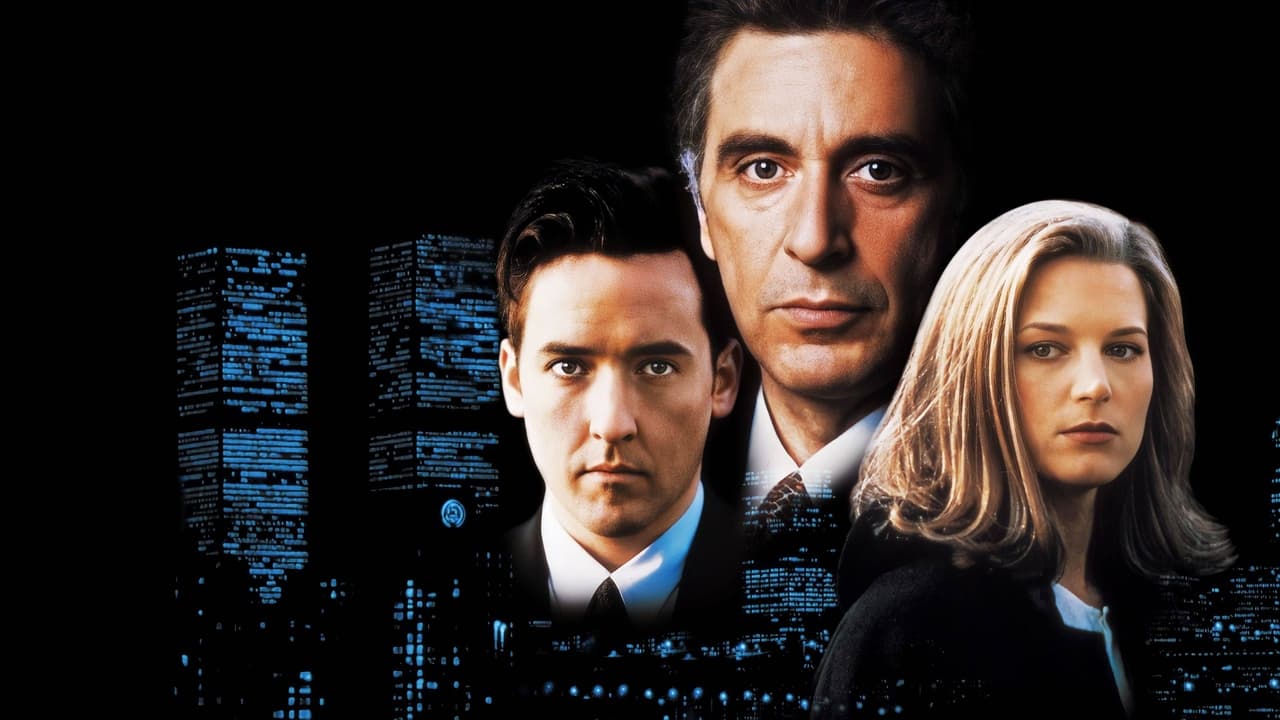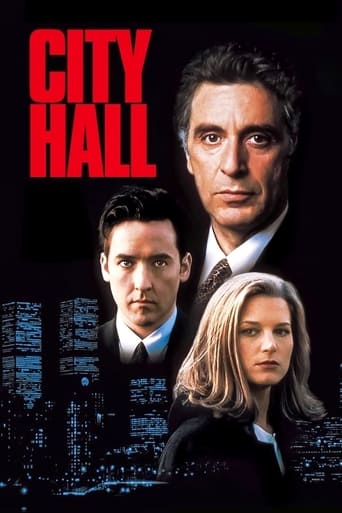

living in jersey for over 10 years and visiting n y c , i am very fond of this film,, John Cusack knocks the ball out of the park with this one, possibly his greatest work,, save for the Jack Bull. a little boy get's killed by in a shootout between a dirty cop and a gangster, john plays the deputy mayor,, brigette fonda is excellent in this film as well playing opposite john,, Al Pacino plays the Mayor of the great city of New York City who buy the way is also trying to get the Democratic National Convention to come there instead of Miami, so there is a lot of political wheeling and dealing there,, this film is a fascinating look at political life in the big city, and what happens between gangsters and politicians..
... View MoreThis film did not do well at the box office, probably because the drama is mostly in the dialog. There are a few tense moments, but most of the suspense and tension in the film come from Pacino's dynamic personality and Cusack's charm. Which is not to say the film is without merit. As a political thriller, it is probably more accurate in the way events are handled than most. You see the people in the mix, you see the steps that have to be taken, and you see the politics involved. Pacino's soliloquy at the funeral of the murdered child is nothing short of incredible, but soliloquy is what Al does best. Splendid performances by Aiello, Landau, Paymer, and Schiff fill out the plot with color and flair, and almost make up for the lackluster Fonda and the much too stereotypical Franciosa. Not at the top of my list, but definitely not at the bottom. Collectible if you are a lover of Pacino or Cusack, rated R for language and violence.
... View MoreIdealistic Louisiana-born John Cusack (as Kevin Calhoun) moves to New York City, where he impresses up-and-coming politician Al Pacino (as John Pappas) enough to become the Mayor's right hand man. The story begins with a shoot-out in Brooklyn, involving a gangster drug dealer and "off-duty" policeman. Unfortunately, an innocent six-year-old boy is shot dead in their crossfire. Naturally, this arouses a heightened interest in justice from the press, police, and public. Mayor Pacino tries to manage the unfolding drama with an eye on keeping his and Gotham City's reputation intact; he is considering a run for the White House, and is bidding on the upcoming Democratic Convention.Deputy Mayor Cusack joins the investigation, on his mentor's behalf. Pretty Bridget Fonda (as Marybeth Cogan) is added to up the feminine quotient, obviously; following one of the story's funerals, she and Cusack have a great car scene. Singing Rogers and Hammerstein songs, Danny Aiello (as Frank Anselmo) leads a terrific supporting cast. "City Hall" is so predictable, reviewers and studio publicity (like the DVD sleeve description) routinely hint at the film's big revelation; it was suppose to unravel slowly, but is painfully obvious too early on - in fact, the film's events, except for the opening boy's death, feel like a well-worn old pair of shoes. But, they are comfortable and fit nice.******* City Hall (2/16/96) Harold Becker ~ John Cusack, Al Pacino, Bridget Fonda, Danny Aiello
... View MoreI read the negative comments before viewing this film and undeterred, went ahead and started watching. I admit that I had to rewind quite a few times as the film is incredibly complex, involved and full of detail. That is a good thing but also, quite unexpected in this culture of car chases, explosions, gratuitous sex and general violence that substitute for plot and character development. In fact, what a welcome departure, however, I am so used to not paying a lot of attention to what I watch. This film is chock full of character development and plot line; the kind that we used to analyze when I was in high school. It requires actual mental participation on the part of the viewer. What a nice change. I would compare it to 'All The President's Men' in terms of generic subject matter. That is, it is a mystery about intense misconduct on the part of elected officials and those with enough influence upon officials to essentially 'own' them. Unlike 'All The President's Men', this film makes an effort to give a couple of the characters actual personality. In this sense the movie is a character study like 'The Negotiatior' with Samuel Jackson and Kevin Spacey. In that movie, their characters are both city employees and the plot is extremely intense. Yet, the plot is dependent on the ability of their characters to cooperate with each other, trust each, and ultimately unite together against the corrupt Police Department. There is more gun fire in this film and the specific plot is different but generically, there are many similarities. I WILL say that City Hall requires a whole lot more concentration. In fact, I was struck how parallel it was to past and present political scandals I've seen in my life going back to Watergate. The thing is, the public knows that something is wrong, for sure! but following the details is hard to do. This movie is not even close to being as complex as real life but it actually is realistic to life in its complexity. I think that is one of the reasons that previous posters have criticized the film: unrealistic expectations.If one watches this knowing what they are about to see and are up to the experience, it really is excellent! I watched it 3 times in a row! The acting is superb and the directing is flawless. The weakest link is John Cusak's accent.
... View More